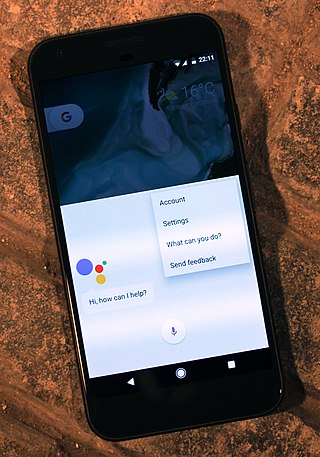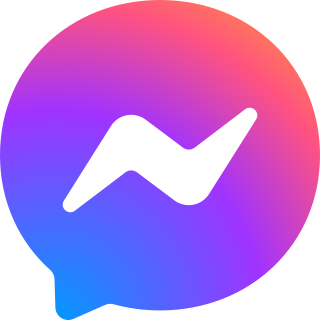
A chatbot is a software application or web interface designed to have textual or spoken conversations. Modern chatbots are typically online and use generative artificial intelligence systems that are capable of maintaining a conversation with a user in natural language and simulating the way a human would behave as a conversational partner. Such chatbots often use deep learning and natural language processing, but simpler chatbots have existed for decades.

Google Talk was an instant messaging service that provided both text and voice communication. The instant messaging service was variously referred to colloquially as Gchat, Gtalk, or Gmessage among its users.
An Internet bot, web robot, robot or simply bot, is a software application that runs automated tasks (scripts) on the Internet, usually with the intent to imitate human activity, such as messaging, on a large scale. An Internet bot plays the client role in a client–server model whereas the server role is usually played by web servers. Internet bots are able to perform simple and repetitive tasks much faster than a person could ever do. The most extensive use of bots is for web crawling, in which an automated script fetches, analyzes and files information from web servers. More than half of all web traffic is generated by bots.
Rich Communication Services (RCS) is a communication protocol standard for instant messaging, primarily for mobile phones, developed and defined by the GSM Association (GSMA). It aims to be a replacement of SMS and MMS on cellular networks with more modern features including high resolution image and video support, typing indicators, file sharing, and improved group chat functionality. As with MMS, mobile service must be activated. Development of RCS began in 2007 but early versions lacked features and interoperability; a new specification named Universal Profile was developed and has been continually rolled out since 2017.

A virtual assistant (VA) is a software agent that can perform a range of tasks or services for a user based on user input such as commands or questions, including verbal ones. Such technologies often incorporate chatbot capabilities to simulate human conversation, such as via online chat, to facilitate interaction with their users. The interaction may be via text, graphical interface, or voice - as some virtual assistants are able to interpret human speech and respond via synthesized voices.

Cleverbot is a chatterbot web application. It was created by British AI scientist Rollo Carpenter and launched in October 2008. It was preceded by Jabberwacky, a chatbot project that began in 1988 and went online in 1997. In its first decade, Cleverbot held several thousand conversations with Carpenter and his associates. Since launching on the web, the number of conversations held has exceeded 150 million. Besides the web application, Cleverbot is also available as an iOS, Android, and Windows Phone app.

WhatsApp is an instant messaging (IM) and voice-over-IP (VoIP) service owned by technology conglomerate Meta. It allows users to send text, voice messages and video messages, make voice and video calls, and share images, documents, user locations, and other content. WhatsApp's client application runs on mobile devices, and can be accessed from computers. The service requires a cellular mobile telephone number to sign up. In January 2018, WhatsApp released a standalone business app called WhatsApp Business which can communicate with the standard WhatsApp client.
Rakuten Viber, or simply Viber, is a cross-platform voice over IP (VoIP) and instant messaging (IM) software application owned by Japanese multinational company Rakuten, provided as freeware for the Android, iOS, Microsoft Windows, macOS and Linux platforms. Users are registered and identified through a cellular telephone number, although the service is accessible on desktop platforms without needing mobile connectivity. In addition to instant messaging it allows users to exchange media such as images and video records, and also provides a paid international landline and mobile calling service called Rakuten Viber Out. As of 2018, there are over a billion registered users on the network.
WeChat or Weixin in Chinese ; lit. 'micro-message') is a Chinese instant messaging, social media, and mobile payment app developed by Tencent. First released in 2011, it became the world's largest standalone mobile app in 2018 with over 1 billion monthly active users. WeChat has been described as China's "app for everything" and a super-app because of its wide range of functions. WeChat provides text messaging, hold-to-talk voice messaging, broadcast (one-to-many) messaging, video conferencing, video games, mobile payment, sharing of photographs and videos and location sharing.

Messenger, also known as Facebook Messenger, is an American proprietary instant messaging service developed by Meta Platforms. Originally developed as Facebook Chat in 2008, the client application of Messenger is currently available on iOS and Android mobile platforms, Windows and macOS desktop platforms, through the Messenger.com web application, and on the standalone Facebook Portal hardware.

Line is a freeware app and service for instant messaging and social networking, operated by the Japanese company LY Corporation, co-owned by SoftBank Group. Line was launched in Japan in June 2011 by NHN Japan, a subsidiary of Naver.
Boyfriend Maker is a dating sim, romance chatbot smartphone app for iOS (iPhone) and Android devices, developed by Japanese studio 36 You Games and distributed under the freemium business model. Boyfriend Maker incorporated advanced artificial intelligence chat technology a decade before products such as ChatGPT. According to the developer's website, Boyfriend Maker is an "app that lets you interact and chat with quirky virtual boyfriends". While each virtual boyfriend has certain unique characteristics, the various instances of the boyfriend are powered by a chat engine, that can utilise vocabulary and knowledge acquired in a chat with one user in subsequent chats with other users.

Telegram Messenger, commonly known as Telegram, is a cloud-based, cross-platform, social media and instant messaging (IM) service. It was originally launched for iOS on 14 August 2013 and Android on 20 October 2013. It allows users to exchange messages, share media and files, and hold private and group voice or video calls as well as public livestreams. It is available for Android, iOS, Windows, macOS, Linux, and web browsers. Telegram offers end-to-end encryption in voice and video calls, and in optional private chats, which Telegram calls Secret Chats.

Google Allo was an instant messaging mobile app by Google for the Android and iOS mobile operating systems, with a web client available in some web browsers. It closed on March 12, 2019.

Google Messages is a text messaging software application developed by Google for its Android and Wear OS mobile operating systems. It is also available as a web app.
LaMDA is a family of conversational large language models developed by Google. Originally developed and introduced as Meena in 2020, the first-generation LaMDA was announced during the 2021 Google I/O keynote, while the second generation was announced the following year.

ChatGPT is a generative artificial intelligence chatbot developed by OpenAI and launched in 2022. It is currently based on the GPT-4o large language model (LLM). ChatGPT can generate human-like conversational responses and enables users to refine and steer a conversation towards a desired length, format, style, level of detail, and language. It is credited with accelerating the AI boom, which has led to ongoing rapid investment in and public attention to the field of artificial intelligence (AI). Some observers have raised concern about the potential of ChatGPT and similar programs to displace human intelligence, enable plagiarism, or fuel misinformation.

Replika is a generative AI chatbot app released in November 2017. The chatbot is trained by having the user answer a series of questions to create a specific neural network. The chatbot operates on a freemium pricing strategy, with roughly 25% of its user base paying an annual subscription fee.










